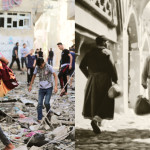In times of moral crisis, silence becomes a language of its own — one of complicity or, at times, cowardice. Today’s world is no stranger to injustices, yet the echoes of silence in response to these bouts of oppression are genuinely resounding.
The crisis in Gaza, where millions face the atrocities of what many are calling a genocide at the hands of Israeli forces, is a glaring testament to this bitter reality. [1]
Non-Muslim voices rising up
Amidst these tribulations, voices from unexpected quarters are being raised.
Eric Cantona, former international footballer and non-Muslim, has publicly condemned the violence against Palestinians, illustrating that empathy and speaking out against tyranny are universal duties, not confined by religious or cultural boundaries. [2]

Yet, the question arises: where are the voices of prominent Muslim individuals? Mo Salah has spoken out, but has it gone far enough? [3]
And why the deafening silence among the vast majority, especially when their influence could stir the world?
The Mesut Özil story
Arsenal’s rapid disavowal of Mesut Özil’s courageous stance against the Chinese persecution of Uyghurs highlighted the moral challenges individuals face, that may often result in choosing political neutrality over human rights advocacy.
At the time Özil, despite facing professional isolation and public backlash, emerged as a figure of integrity, underscoring the critical role that well-known figures play in championing justice.
And this incident is an important reminder of the heavy costs of silence in the face of oppression and the commendable courage displayed by those who risk their positions for humanitarian principles.
A Prophetic directive
This ongoing situation also brings to mind a profound teaching reported by Tāriq ibn Shihāb.
“A man asked the Prophet, peace and blessings be upon him, as he had his leg in the stirrup, ‘Which jihād is best?’
“The Prophet ﷺ replied, ‘A word of truth before a tyrannical ruler.'” [4]
This narration is not just a reflection of the spiritual value of courage in Islam; it’s a clarion call to Muslims — especially those of influence — to embody this courage against injustices.
The fear of “cancellation”
In today’s digital age, “cancel culture” is a threat that worries many of us.
Public figures fear severe backlash, the total ruination of their careers, and social ostracisation.
However, the essence of courage imbued in Islamic teachings is not the absence of fear, but the recognition that a greater good exists beyond one’s personal sphere of comfort and safety. The narrative that “evil prevails when good people remain silent” has never been more relevant.
When those who possess the power to affect change remain silent, they inadvertently allow the perpetuation of injustice. Their silence is often perceived not as neutrality, but as complicity, a betrayal of the very principles they’re expected to uphold.
Braving the consequences
Fear of detention or travel restrictions, especially when considering pilgrimages, is a legitimate concern. However, the moral compass of Islam necessitates the pursuit of justice, even when faced with adversity.
This isn’t a call to recklessness, but a reminder of the need for strategic, brave, and conscientious activism.
Speaking against injustice is not a responsibility confined to the realm of individual action. It’s a collective duty that Muslims, in solidarity with the broader human species, must undertake. The plight of the people in Gaza is not just a regional or religious crisis; it’s a humanitarian one, demanding global empathy and action.
Confronting these brutal injustices requires breaking barriers of fear and self-preservation. It’s imperative to find ways to voice opposition, be it through social media, peaceful protests, or humanitarian support, even amidst apprehensions of backlash or “cancellation”.
The moral high ground lies in aligning one’s actions with one’s convictions; the current horrors unfolding in Gaza are a test of the world’s, especially Muslim influencers’, commitment to human dignity and justice.
And the Prophetic wisdom really underscores this path: in the face of tyranny, not speaking up is not an option. To stay silent is a betrayal — of one’s faith, of one’s conscience, and of the very essence of our shared humanity.
Action points
-
Realise that both Muslim and non-Muslim voices advocating for justice in Gaza is more effective than one or the other.
-
Encourage prominent Muslims to speak out against Gaza's crisis and use their influence to raise awareness.
-
Remind fellow Muslims of their duty to confront injustice, even in the face of cancel culture.
Also read
- Calling out atrocity propaganda to end Palestinian genocide
- Israel declares war on Gaza: a call for Muslim unity and action
- Western state media in disinformation drive to justify Gaza genocide
- Dr. Ali Muhammad al-Sallabi writes to US and allies on Gaza genocide
Source: Islam21c
Notes
[1] https://www.islam21c.com/politics/calling-out-atrocity-propaganda-stop-gaza-genocide/
[2] https://www.instagram.com/p/Cyfjx1qNFjG/
[3] https://www.reuters.com/sports/soccer/liverpools-salah-calls-end-massacres-gaza-2023-10-18/
[4] Sunan al-Nasā’i 4,209; https://sunnah.com/nasai:4209









